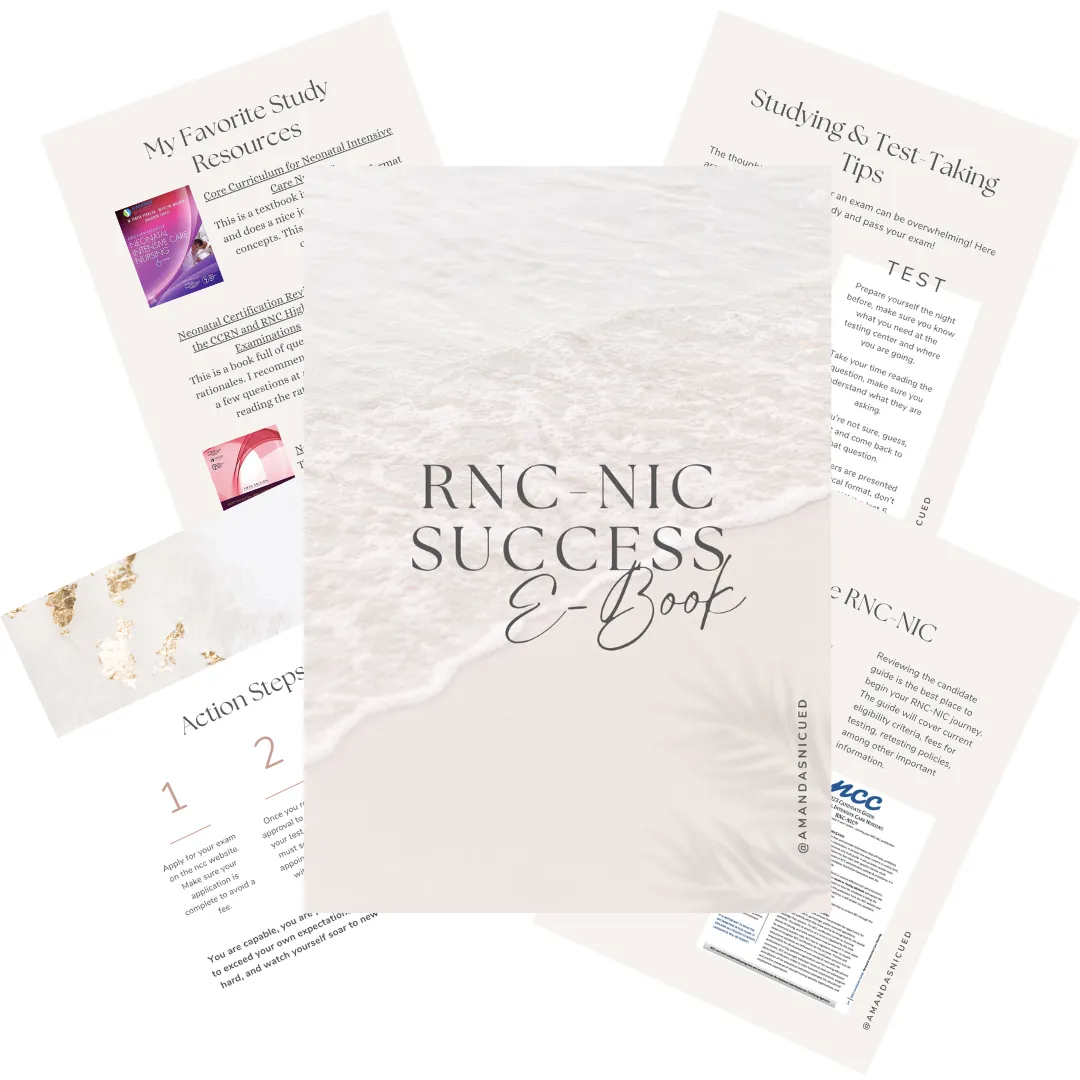
Welcome to Amanda's NICU Education




Hi! My name is Amanda. I'm a NICU nurse, Clinical Nurse Specialist, NICU Educator... basically your NICU BFF. If you want to talk NICU, I'm here for you! I love everything about NICU nursing and I'm eager to learn and share my knowledge with all my NICU friends.
I have been a NICU nurse since 2009 I am currently a Clinical Nurse Specialist in a Level IV NICU in Los Angeles.
I am passionate about educating the next generation of NICU nurses. I share my knowledge through platforms such as Instagram and Facebook and am excited to have you here on my website!
Click on the button below to sign up for my newsletter filled with NICU education and tips for all experience levels.

Not very many people love taking tests but as a self-acclaimed "forever student" who has taken (and passed) five different certification exams I am no longer afraid of tests! "Way to brag", you might be thinking but I want to help YOU pass your certification exam too!
Introducing Amanda's RNC-NIC Success digital course - your ultimate study companion!
Gain unlimited, on-demand access for life, ensuring you're primed to ace your certification exam.
I'm here to help you succeed and I can't wait for you to share with me that you PASSED the RNC-NIC EXAM!!!










Supporting NICU Parents
Last Sunday, November 17th, we observed Prematurity Awareness Day—a day to honor the tiniest fighters and their incredible families while shining a light on the critical work NICU professionals do every day. Prematurity affects thousands of families, and as NICU nurses, we play a vital role in providing these fragile babies with the best possible care.
One of the most powerful ways we can advocate for our patients is by investing in our own knowledge and skills. Whether you're preparing to earn your specialty certification or diving deeper into topics like neurodevelopment care, education empowers us to make an even greater impact in the NICU.
That's why I'm excited to partner with Synapse Care Solutions to bring you 40% off any of their courses! I have learned so much in my career from Kathi and the team over at Synapse and if you haven't checked them out, you definitely need to! From mastering NICU nursing concepts with me to learning all things baby brains with Synapse Care, we're here to support your growth as a NICU professional.
Let’s continue to raise the bar for NICU care—because our babies and families deserve nothing less.
Get 40% off from Synapse Care Solutions!
Supporting NICU Families: Building Connections Through Compassion and Communication
It’s no secret—the NICU can feel like an overwhelming place for families. As a NICU nurse, you have a special opportunity to provide comfort, guidance, and support during what might be one of the toughest times in a family's life. Let’s chat about some practical and heartfelt ways you can connect with families and make this journey a little bit easier for them.
Building Trust and Relationships with Families
Start with a Warm Introduction: When you meet a family, start by introducing yourself and sharing a quick overview of the day’s plan. Take a moment to ask them how they’d like to be addressed—some prefer “mom” or “dad,” while others are more comfortable with their first names. This small step sets the tone for trust and respect.
Listen to Understand, Not Just to Respond: Give families your full attention when they’re sharing their concerns or hopes. Ask them about their goals for the day, especially if their baby has been in the NICU for a while. Sometimes, celebrating small wins can make a huge difference. Use open-ended questions like, “What’s your understanding of today’s care plan?” to make sure everyone’s on the same page.
Show Empathy Every Step of the Way: Acknowledging emotions can go a long way. Instead of brushing off their concerns, validate them. A simple, “I can see how hard this is for you,” can offer incredible comfort. Avoid minimizing their feelings—this is a big moment in their lives.
Communicating Effectively
Speak Their Language: NICU terminology can sound like a foreign language to families. Break down complex medical terms into simple, digestible explanations. Think about how you’d explain it to a friend with no medical background.
Be Honest and Transparent: Even when the news is tough, families deserve the truth. Avoid making promises you can’t keep, but assure them you’re there to answer questions and support them through every step.
Keep Them in the Loop: Regular updates mean the world to NICU families. Let them know how their baby is doing and always leave room for their questions or concerns.
Family-Centered Care is Key: Encourage parents to be part of their baby’s care. Involving them in small tasks, like diaper changes or skin-to-skin time, can make a big impact on their confidence and connection.
Handling Difficult Conversations
Difficult conversations are inevitable in the NICU. Emotions often run high, and families may react in ways that reflect their stress, fear, or frustration. Navigating these moments with patience and professionalism can help de-escalate tensions and foster trust. Here are some strategies to handle challenging interactions effectively:
1. Start with Empathy
Recognize that families are often in crisis mode. The NICU is not just about their baby—it’s about their whole world being turned upside down. Begin the conversation by acknowledging their feelings.
Example: “I can see how worried you are about [baby’s name]. It’s completely understandable to feel this way.”
Empathy shows families that you’re on their side and working together toward the same goal: their baby’s health and well-being.
2. Listen More, Speak Less
When families are upset, they want to feel heard. Give them your undivided attention and listen to understand, not just to respond.
Avoid interrupting or offering solutions too quickly.
Use active listening techniques like nodding, maintaining eye contact, and summarizing their concerns to ensure they feel validated.
Example Response: “It sounds like you’re really concerned about how the plan of care is going to impact your baby. Let’s talk through this together.”
3. Stay Calm and Composed
Families often look to healthcare providers to set the emotional tone. If they’re upset, keeping your voice calm and steady can help defuse the situation.
Avoid reacting defensively, even if their frustration feels directed at you.
Use reassuring language like, “Let’s work through this together,” to maintain a collaborative atmosphere.
4. Set Clear Boundaries
While empathy is essential, it’s equally important to set professional boundaries. If a conversation becomes hostile or counterproductive, gently but firmly steer it back on track.
Example: “I understand this is an incredibly emotional time. Let’s focus on what we can do right now to support [baby’s name] and make sure their needs are being met.”
If needed, politely excuse yourself to consult with a supervisor or involve a social worker for additional support.
5. Be Transparent, Yet Sensitive
Honesty is critical, especially when families are struggling with uncertainty or tough decisions. However, delivering difficult information requires sensitivity and care.
Use plain language to explain the situation without sugarcoating or creating false hope.
Offer to repeat or rephrase information as needed and allow time for them to process.
Example: “This is not the news any of us wanted, but I want to make sure you have all the information to make the best decisions for [baby’s name]. I’ll be here to answer any questions as they come up.”
6. Offer Practical Solutions and Next Steps
After addressing concerns, focus on actionable steps families can take. This can help shift the conversation from frustration to problem-solving.
Suggest ways they can participate in their baby’s care, like holding or soothing them.
Provide resources such as a meeting with the social worker, educational materials, or referrals to support groups.
Example: “Let’s arrange a meeting with the neonatologist so you can get all your questions answered in more detail. In the meantime, would you like to learn more about how you can help during care times?”
7. Involve Your Team When Needed
Sometimes, a difficult conversation may require input from other team members, such as a social worker, chaplain, or charge nurse. Bringing in additional support can provide families with a broader range of resources and perspectives.
Example: “I’d like to bring in our social worker. They’re really great at helping families navigate these tough moments and can connect you with additional support.”
8. Focus on the Baby’s Care
If emotions escalate, gently redirect the conversation to the baby’s care plan. This keeps the discussion constructive and centered on shared goals.
Example: “I know this is a lot to take in. Let’s review what we’re doing today to support [baby’s name] and how we’re monitoring their progress.”
This approach helps families feel grounded and reminds them that everyone is working together for the baby’s best interests.
9. End on a Supportive Note
Before wrapping up, reassure the family that their concerns matter and you’re there to support them.
Example: “Thank you for sharing your thoughts with me. I’ll make sure the rest of the team is aware of your concerns, and we’ll continue to work together to give [baby’s name] the best care possible.”
Offer follow-up opportunities, such as scheduling a care conference or encouraging them to reach out with further questions.
Difficult conversations, while challenging, are opportunities to strengthen trust and build rapport with families. By leading with empathy, staying calm, and focusing on solutions, you can turn these moments into meaningful connections that support families during their NICU journey.
Providing End-of-Life Care with Compassion
End-of-life care is one of the hardest parts of our job, but it’s also one of the most meaningful. Here’s how to provide support with care and dignity:
Be Honest and Open: Share information about the baby’s condition with compassion and clarity.
Listen Actively: Validate the family’s feelings and let them know you’re there to support them.
Comfort Always Comes First: Focus on pain management and comfort measures to minimize the baby’s distress.
Honor Their Choices: Involve families in decisions about end-of-life care and encourage them to spend time with their baby.
Support After the Loss: Grief doesn’t end when they leave the hospital. Offer resources like bereavement counseling or support groups to help them navigate this incredibly difficult time.

At the heart of it all, building relationships with NICU families comes down to empathy, honesty, and compassion. By creating an open line of communication and truly supporting families, you can make a profound impact during their NICU journey.
Amanda xoxo

December 2023 Certification Review Webinar
NICU Certification Review



Ready to kickstart your journey to becoming a certified NICU nurse?
Look no further!
Grab my FREE E-Book packed with essential study and test-taking strategies for the RNC-NIC.
In the E-Book I give you the resources you need including the link to access the candidate guide, several types of books to study from, some of my favorite strategies, an outline of the content you should review, and a blank calendar for you to make your study plan!
Frequently Asked Questions About the RNC-NIC exam

What is the RNC-NIC?
The RNC-NIC is a competency-based exam that tests the specialty knowledge of nurses in the United States & Canada who care for critically ill newborns and their families.
The RNC-NICU is a nationally recognized certification that recognizes the registered nurse for their specialty knowledge and skill.

Who can take the RNC-NIC exam?
Nurses can take this exam after a minimum of two years experience in the NICU caring for critically ill newborns and their families.

Which books should I use?
I'm glad you asked! There are many excellent books to help you prepare for the RNC-NIC, I gathered ande describe each of them for you in my FREE e-book.
Is there a course to help me study?
Yes! Many hospitals host their own certification course and there are a few online courses. See my RNC-NIC test taking tips E Book for more information
What happens if I don't pass the exam?
If you don't pass the exam on your first try you can try again after 90 days. You will have to reapply after 90 days and pay a retest fee. There is no limit to the number of times you can take the exam (however a candidate can only sit for the exam twice per year).

Can I make more money if I take the RNC-NIC exam and get certified?
Yes! Many hospitals provide a raise or a bonus for nurses with specialty certifications. Hospitals also typically hire at a higher base salary when nurses have a certification.

Find me @amandasnicued on these channels or Email me
hey nurses don't miss out
© Copyright 2024. AmandasNICUEd. All rights reserved. | Terms & Conditions | Privacy Policy Contact: [email protected]

